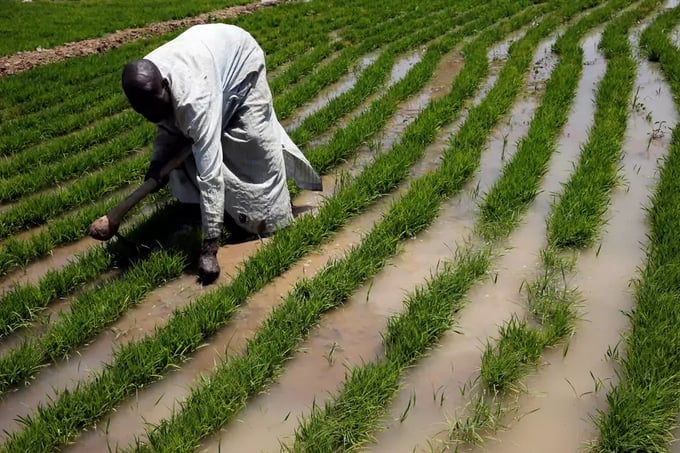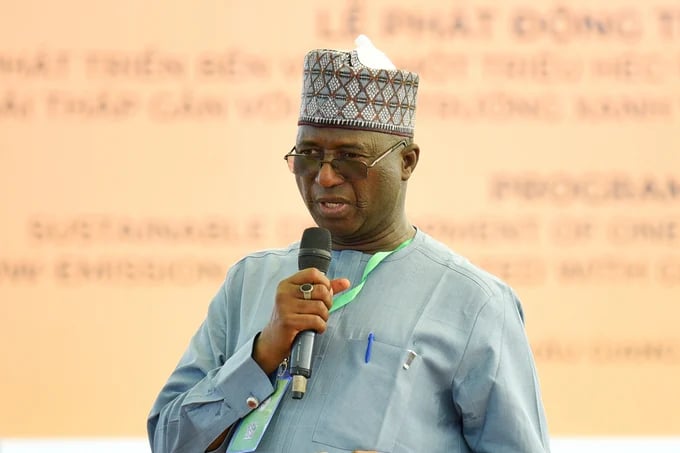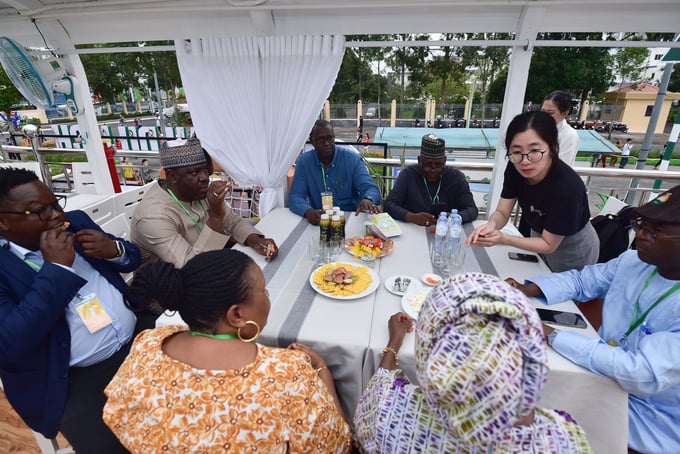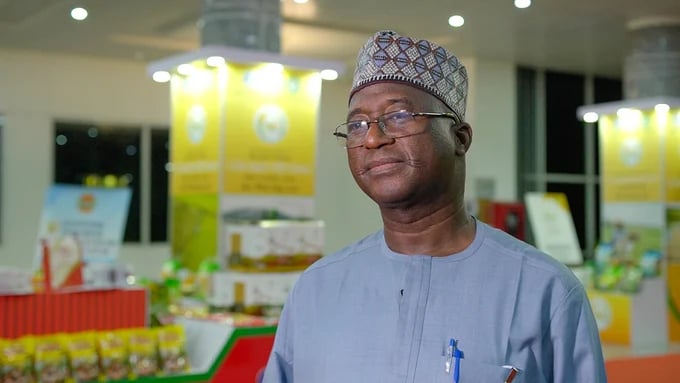June 16, 2025 | 18:47 GMT +7
June 16, 2025 | 18:47 GMT +7
Hotline: 0913.378.918
June 16, 2025 | 18:47 GMT +7
Hotline: 0913.378.918

Rice farmers in Bauchi region, Nigeria.
Africa holds the potential to emerge as a global food supply hub, as 60% of the world's agricultural land is on the continent. However, the average rice yield remains modest, ranging from 2-4 tons per hectare. The self-sufficiency of the entire region in rice production stands at only 60-65%, leading many African nations to import food from Asia.
The African agricultural sector confronts various challenges, including low productivity due to limited access to inputs, outdated farming methods, and underdeveloped infrastructure. Climate change exacerbates crop failures, posing a threat to food supplies. Post-harvest losses, transportation difficulties, and restricted market access further impede agricultural development.
The rice industry in Africa needs more crucial value chain links, with minimal contribution from reputable businesses. As a relatively young and unstable sector, the rice value chain faces increasing fragmentation and challenges.
The Federal Republic of Nigeria, the most populous country in Africa with a population of 213.4 million people (as of 2021) and an area of 923,768 km2, possesses approximately 70.8 million hectares of agricultural land. Key food crops include corn, cassava, beans, sweet potatoes, millet, and rice.
Nigeria has experienced significant growth in rice production in recent years, rising from 3.7 million tons in 2017 to 8.55 million tons in 2023. The total national milled rice output reached 5.56 million tons.
However, the recorded demand for milled rice in Nigeria stood at 7.83 million tons, resulting in a supply-demand gap of 2.3 million tons. The newly cultivated rice area only covers 1 million hectares, while the potential area is 4.3 million hectares.
The Ministry of Agriculture has set ambitious targets for the next decade to enhance rice production in Nigeria. By 2034, Nigeria aims to achieve an annual rice output of 34 million tons, cultivate 2.7 million hectares, and attain an average yield of 6-7.5 tons per hectare.
Furthermore, Nigeria is actively concentrating on developing eight improved rice varieties resilient to climate change and two hybrid rice varieties. It is anticipated that by 2024, this African nation will generate 66.6 tons of pure seed and over 400,000 tons of certified seeds.
The remarkable transformation of the food system stands out as a key feature in Vietnam's agricultural industry, capturing the attention of international visitors. The delegation from Nigeria was already acquainted with the message from Minister of Agriculture and Rural Development Le Minh Hoan, emphasizing the centrality of farmers in development. Their firsthand observations of the Mekong Delta's countryside during their visit to Vietnam affirmed that the success of Vietnam's rice industry can be attributed to the government's unwavering support for small-scale farmers.

Nigerian delegates attended the launching ceremony of the 1 million hectares of high-quality, low-emission rice program on December 12 in Hau Giang. Photo: Quynh Chi.
Expressing his admiration, Mr. Abubakar Abdullahi, the Director of Engineering and Mechanization from the Nigerian Ministry of Agriculture and Food Security, commended Vietnam's agricultural development. He found it particularly heartening to witness the Vietnamese government actively supporting farmers through tangible initiatives, with the Rice Festival as a prominent example.
"I would like to thank the Organizing Committee and the Vietnamese Government for orchestrating this event. The festival instills hope in the small-scale farming community, symbolizing the comprehensive support provided by management agencies—covering production, processing, and marketing—to ensure that farmers' endeavors do not go in vain," remarked Mr. Abubakar Abdullahi.
Encouraging the Ministry of Agriculture and Rural Development, Director General Abubakar Abdullahi advocated diversifying support forms and segmenting farmer households to ensure equitable development. Key areas to address include seed assistance, site clearance, and irrigation infrastructure development.

Mr. Abubakar Abdullahi, Director of Engineering and Mechanization, Ministry of Agriculture and Food Security of Nigeria. Photo: Quynh Chi.
Furthermore, leaders in the Nigerian agricultural sector actively endorse Vietnamese expertise in rice science and the ability to preserve and restore desirable varieties. Mr. Abdullahi emphasized, "High-quality seeds serve as the cornerstone of successful agriculture." He stressed the necessity for research institutes and organizations to receive ample funding to develop high-yield, pest-resistant, climate-resistant, and early-maturing seeds.
Drawing from his experience, Mr. Abdullahi underscored the importance of expanding the network of rice processing and milling factories across Nigeria. According to him, this expansion would enable Vietnamese farmers to minimize post-harvest losses and foster local rice production instead of relying solely on large export-oriented factories.
Following the Policy Dialogue Workshop on South-South cooperation held during the Rice Festival, the Director of Nigeria identified five key areas for agricultural collaboration with Vietnam: fortifying the seed system, adopting agricultural mechanization techniques, enhancing value addition for crops, strengthening agricultural extension services, and promoting the cooperative model.
In particular, Mr. Abdullahi expressed his hope that Vietnam would support Nigeria in training agricultural extension officers, creating a ripple effect. He also sought to learn from Vietnam's experience in establishing cooperatives, as Nigeria still faces challenges in connecting farmers despite constant encouragement for the cooperative model.

The Nigerian delegation visited the Xang Xa No canal during the International Festival of Vietnam Rice Industry - Hau Giang 2023. Photo: Tung Dinh.
African delegates believe that the Vietnamese Government's guiding role has been instrumental in the success of domestic cooperatives. They hope Nigeria can integrate similar strategies, build a robust cooperative ecosystem, and facilitate farmers' easy access to financial resources.
On November 25, Nigeria achieved a significant milestone by cultivating rice during the dry season, a departure from its previous dependence on rain-fed rice cultivation. This achievement opens up new opportunities for Nigerian rice production. However, Mr. Abdullahi stressed that a comprehensive irrigation system ensures consistent output in dry-season rice cultivation.
In this context, South-South cooperation gains heightened significance. Nigeria aims to optimize irrigation methods for agriculture, and Vietnam, with its advanced irrigation system, can play a pivotal role in improving the quality of rice production in Africa.
While Africa possesses vast plains, economic constraints hinder the application of high technology. Farmers face increased labor demands due to these barriers. Therefore, collaborative efforts between governments are crucial to providing Nigerian farmers access to mechanization tools and enhancing overall farming efficiency.

The Nigerian representative wishes to discuss further with the Ministry of Agriculture and Rural Development through South-South cooperation programs.
Mr. Abdullahi emphasized, "If we can achieve the same productivity levels as Vietnam – increasing from 4 tons per hectare to 9 tons per hectare – Nigerian farmers will break free from poverty. That's the crucial objective. The success of Vietnam's agricultural industry serves as a source of inspiration, providing knowledge that transcends differences in crops, climate, and soil. We are optimistic that Vietnam's methods will establish a solid foundation for sustainable agricultural development in Nigeria."
The Director of Engineering and Mechanization at the Ministry of Agriculture and Food Security in Nigeria expressed confidence that South-South cooperation will significantly contribute to the shared prosperity of the global agricultural sector, yielding benefits for both countries. This collaborative effort underscores the potential for mutual growth and development, fostering a positive impact on the livelihoods of farmers and the overall agricultural landscape in Nigeria and Vietnam.
Translated by Quynh Chi

(VAN) The working delegation from the Ministry of Agriculture and Environment conducted an important trip to the Netherlands to strengthen strategic partnerships and sustainable development in the agricultural sector.

(VAN) The letter ‘A Plea from the Ocean’ not only evokes emotion but also awakens the human conscience to the responsibility of protecting life on Earth.

(VAN) The Department of Agriculture in South Africa has announced the country’s first mass vaccination of poultry to prevent local birds from contracting avian influenza.

(VAN) Establishment of the Mekong Delta Regional Agricultural Linkage Center, aiming for a closed value chain, deep processing, trading platforms, and international market connectivity.

(VAN) Gia Lai province has recently recorded 460 rare species of animals and plants, contributing to forest conservation and biodiversity planning in the region.

(VAN) Ms. Caroline Beresford, New Zealand Ambassador to Vietnam, expressed confidence that agricultural cooperation between Vietnam and New Zealand will develop sustainably, be climate-resilient, and promote gender equality.

(VAN) Vietnam reaffirms its commitment to international cooperation in fostering sustainable and responsible fisheries while ensuring resilient livelihoods for small-scale fishing communities.